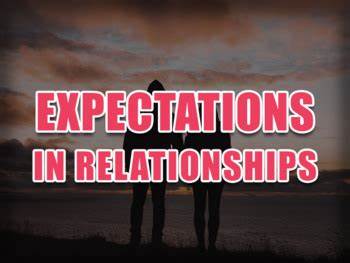Relationships—whether romantic, familial, or friendly—are one of the most important parts of human life. They give us joy, comfort, and support. But they also come with challenges. One of the biggest challenges in any relationship is managing expectations. When expectations are not communicated or met, disappointment and misunderstandings can occur. However, if expectations are handled the right way, they can strengthen the bond between people.
In this blog, we’ll explore how to manage expectations in relationships in a healthy, practical way. We’ll cover perspectives from psychology, communication skills, emotional intelligence, and real-life experience. This blog is written in simple language so that readers of all ages can understand and apply the ideas.

What Are Expectations in Relationships?
Expectations are beliefs or hopes about how someone should behave, feel, or respond in a relationship. For example, you may expect your partner to remember your birthday, or you might expect your friend to be there when you’re feeling low. These expectations are natural—we all have them. But when they are not clearly expressed or are unrealistic, they become the root of frustration.
Often, people assume that their loved ones “should know” what they expect. But nobody is a mind reader. Managing expectations doesn’t mean lowering them; it means understanding, adjusting, and communicating them effectively.
Why Managing Expectations Is Important
Unmet expectations are one of the top reasons for relationship breakdowns. Whether it’s a spouse who feels unappreciated or a friend who feels ignored, disappointment can slowly build into resentment. Managing expectations helps to avoid these negative emotions and promotes clarity and trust.
According to psychologist Dr. John Gottman, one of the keys to healthy relationships is open dialogue about needs and desires (Gottman Institute, 2021). When expectations are clearly communicated, both people can work together to meet them realistically.
Self-Awareness: Understand Your Own Expectations
The first step in managing expectations is to understand what you expect from others and why. Sometimes, expectations are based on childhood experiences, cultural values, or past relationships. For example, if you grew up in a family where everyone ate dinner together, you might expect your partner to do the same.
Being aware of your expectations helps you decide whether they are fair and healthy. Ask yourself:
- Is this expectation reasonable?
- Have I communicated it?
- Would I feel comfortable if the roles were reversed?
This type of reflection builds emotional maturity and avoids placing unfair pressure on others.
Communication: Speak Honestly and Kindly
Good communication is essential in managing expectations. Many conflicts arise not because expectations are too high, but because they are unspoken. It’s important to share your needs calmly and clearly. For example, instead of saying “You never listen to me,” try saying “I feel hurt when I don’t feel heard. Can we talk more openly?”
Use “I” statements rather than “You” statements. This keeps the conversation from sounding like blame and encourages understanding.
Also, listen actively. Managing expectations is not just about expressing your own needs but also hearing and respecting the needs of the other person.
Flexibility: Allow Room for Differences
No two people are the same. Everyone has different personalities, habits, and ways of showing love or care. Expecting someone to act exactly the way you do is not fair. For example, you might enjoy texting often, while the other person prefers phone calls once a day.
The key is to find middle ground. Flexibility doesn’t mean giving up your needs—it means understanding that your partner or friend may meet those needs in different ways. Being open to compromise builds a stronger, more respectful bond.
Realistic Expectations vs. Unrealistic Ones
It’s normal to have needs in a relationship, but it’s important to separate realistic expectations from unrealistic ones. Realistic expectations might include:
- Being treated with respect
- Honest communication
- Emotional support
Unrealistic expectations often look like:
- Believing your partner will never make mistakes
- Expecting constant attention or agreement
- Hoping others will always prioritize you over everything else
When expectations are too high or based on fantasy (like movies or social media), they often lead to disappointment. Learning to balance hope with reality is an important relationship skill.
Respect Boundaries
Managing expectations also means respecting personal boundaries. Everyone needs personal time, space, and independence. Sometimes, expectations cross the line into control. For example, expecting your friend to always say yes to plans or expecting your spouse to never spend time alone is not healthy.
Respecting boundaries shows maturity and trust. It also prevents burnout and resentment. As author Brené Brown notes, “Clear is kind. Unclear is unkind.” Clear boundaries are a form of kindness that protect both people (Brown, 2018).
Handling Disappointments Gracefully
Even with clear communication and healthy expectations, disappointments will happen. People are human—they forget, get tired, or struggle emotionally. When this happens, it’s important to respond with empathy and grace.
Instead of reacting with anger, take a moment to understand the situation. Was it a misunderstanding? Was the person going through something? Responding with patience shows emotional strength and deepens the bond.
If the disappointment is repeated or hurtful, it’s okay to talk about it honestly and decide how to move forward. Managing expectations doesn’t mean accepting bad behavior—it means making thoughtful decisions with compassion.
Managing Expectations in Different Relationships
In Romantic Relationships
Romantic partners often have the highest expectations from each other. Regular check-ins, honest discussions about goals, and mutual respect go a long way. It’s also important not to expect your partner to fulfill every role—they can’t be your friend, therapist, cheerleader, and problem-solver all at once.
In Friendships
Friendships thrive on mutual effort. Expecting a friend to always reach out first or agree with you can harm the bond. Healthy friendships respect each other’s time and individual lives.
In Family Relationships
With family, expectations can be complicated due to tradition and obligation. It’s important to express individual needs while being respectful of family values. Open conversations can reduce guilt and foster healthier bonds.
Practice Gratitude and Acceptance
Sometimes we get so focused on what we’re not getting that we forget to appreciate what we do have. Practicing gratitude can shift your mindset and make relationships more joyful. Instead of expecting perfection, focus on the effort and care the other person gives.
Acceptance doesn’t mean settling for less—it means appreciating people as they are and celebrating the uniqueness they bring into your life.
How to tackle with Exam Anxiety for better Results
Final Thoughts
Managing expectations in relationships is a lifelong skill. It requires self-awareness, communication, patience, and emotional intelligence. When done the right way, it builds stronger, more resilient bonds.
The goal is not to expect nothing, but to expect mindfully—with clarity, kindness, and realism. Relationships are not perfect, but with the right tools, they can be deeply fulfilling.
References
- Gottman Institute. (2021). The Four Horsemen: Criticism, Contempt, Defensiveness & Stonewalling. Retrieved from https://www.gottman.com
- Brown, Brené. (2018). Dare to Lead: Brave Work. Tough Conversations. Whole Hearts. Random House.
- Psychology Today. (2022). Managing Expectations in Relationships. Retrieved from https://www.psychologytoday.com
- Verywell Mind. (2023). How to Set Healthy Relationship Expectations. Retrieved from https://www.verywellmind.com

